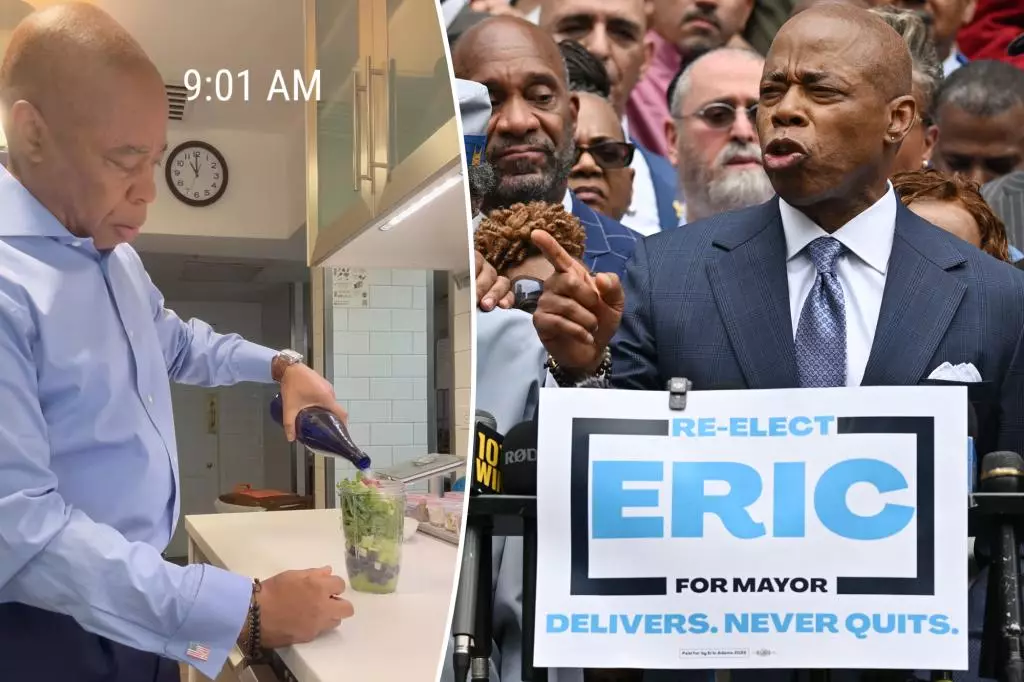In a political landscape where politicians often struggle to connect deeply with younger, digitally savvy voters, New York Mayor Eric Adams is making a striking and unconventional move. Rather than sticking to traditional press conferences and carefully scripted speeches, Adams is embracing the social media influencer model with surprising enthusiasm—posting “Get Ready With Me” (GRWM) videos, sharing day-in-the-life clips, and even showcasing mundane moments like ironing his own clothes. This approach is more typical of TikTok personalities than elected officials, and it signals an innovative attempt to reshape how politicians engage with the public.
Adams isn’t just superficially dabbling in social platforms; he’s leaning in wholeheartedly. His Instagram feed, which might easily be mistaken for that of a lifestyle influencer, provides an intimacy previously unseen in New York City politics. By sharing slices of his daily routine and personal habits, he cultivates a relatable, approachable image that counters the often stiff and distant perception of public officials. His claim that people stop him in the street to comment on his ironing practice is an almost surreal testament to how even the smallest authentic moments can create genuine connection in an era dominated by curated perfection.
Challenging Traditional Media and Playing the “Game” of Social Media
Adams candidly admits that mainstream media outlets have been less than enthusiastic in covering his re-election campaign. His strategic pivot toward streaming platforms and social media is a direct response to this perceived omission. To Adams, social media isn’t merely a supplementary tool; it’s the battleground where political narratives are won or lost. “You have to respect the game,” he stresses, venerating social media as the primary venue for authentic engagement rather than secondhand reporting.
In this sense, Adams harnesses a modern communication axiom: if traditional gatekeepers shut the door, step through the window of digital channels that allow direct conversations with constituents. The mayor’s insistence on showing his “authentic” self—cigar in hand, sipping bourbon, sharing both his good days and bad—rises from a strategic understanding that genuine connection drives political support in ways polished speeches never will. The shift toward raw, unscripted content embodies a democratization of political communication, where control is ceded to openness and vulnerability rather than tightly guarded narratives.
Authenticity or Calculated Branding?
While Adams’ embrace of influencer-style content is innovative, it inevitably raises questions about authenticity versus strategy. Social media influencer culture is heavily rooted in crafting an appealing persona as much as it is about sharing real moments. His emphasis on “being who I am” walks a fine line between genuine self-expression and politically savvy branding. The choice to reveal himself in unguarded moments—from household chores to social drinking—may humanize him, but it also functions as a carefully constructed narrative designed to break down barriers between leader and electorate.
There is an undeniable risk that some voters may perceive these efforts as gimmicky or pandering, a political stunt rather than an honest gesture. Yet, Adams’ willingness to blur the personal and the political signals a recognition that contemporary public figures must innovate to sustain relevance. His experiment with influencer culture is as much about reclaiming political storytelling as it is about fostering a more accessible leadership image.
Addressing Controversy and Embracing Broad Support
Beyond his social media campaign, Adams’s candidness about his past—especially regarding the federal bribery and corruption indictment for which he was pardoned by former President Donald Trump—adds complexity to his public persona. He frames himself as a man unfairly targeted, emphasizing his own innocence while reluctantly acknowledging missteps by associates. This willingness to confront controversy head-on further blurs the lines between traditional political caution and raw transparency.
Adams’ openness about accepting endorsements “from anyone who loves this city” notably including Trump, reveals a pragmatic streak. It reflects a focus on unity and forward momentum over ideological purity. This pragmatic inclusivity combined with his influencer-style outreach creates a multifaceted strategy that attempts to engage a broader, more fragmented electorate.
The Future of Political Engagement?
Adams’ approach sparks a broader conversation about the evolving nature of political communication. As social media’s influence grows, traditional political decorum is giving way to more personalized, multimedia storytelling. Whether other politicians follow the mayor’s lead remains to be seen, but Adams’ experimental blending of influencer culture and urban leadership offers a window into how future campaigns might be crafted—not just to compel voters but to build sustained, emotionally resonant connections in a fragmented media environment. His campaign is a reminder that successful politicians are increasingly those who master the art of authentic digital presence, while skillfully navigating the challenges it presents.

